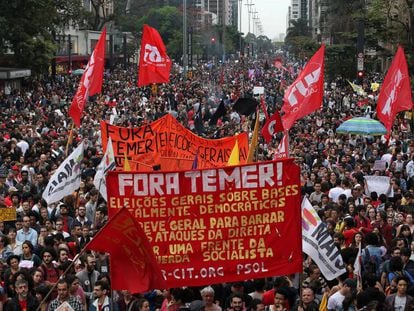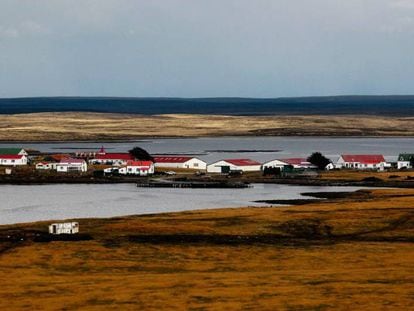Latin America’s new right-leaning leaders make United Nations debut
Presidents of Argentina, Brazil and Peru share optimistic vision of countries at General Assembly
The new presidents of Argentina, Brazil and Peru – all of whom have made a sharp turn to the right in terms of their social and economic policies – took the floor at the United Nations (UN) General Assembly on Tuesday to share their optimistic vision of their countries. Argentinean President Mauricio Macri, Brazilian President Michel Temer and Peruvian President Pedro Pablo Kuczynski all said they wanted more participation in the international community and defended a return to classical economic policies. They also said that their administrations have renewed people’s faith in the future after the economic crisis.

As per tradition, ever since Brazilian Ambassador Osvaldo Aranha presided over the first General Assembly in 1947, Brazil was the first country to take the floor. Temer defended the recent impeachment of former President Dilma Rousseff, saying it showed “the strength of institutions under the watchful eye of a plural society.” “The rules apply to everyone, including the most powerful. That is what Brazil is showing the world,” he added.
Former Brazilian President Luiz Inácio Lula da Silva was indicted in a corruption probe last week, while one of Temer’s ministers resigned after he was implicated in the bid-rigging and bribery scheme at Petrobras, the state-owned oil company. The Brazilian president himself was drawn into the controversy in June after a witness named him in the case.
Representatives of six countries left the chamber during Temer’s speech in protest against Rousseff’s impeachment
Temer, who assumed full presidential duties in early September, sold the crowd an optimistic image of Brazil. “Trust is being restored and a more prosperous horizon lies ahead,” he told the roomful of international leaders after defending “the path of fiscal and social responsibility” his government has chosen. His administration has also launched an ambitious program to grant government contracts and privatize various public companies.
Meanwhile, the representatives of six Latin American countries – Venezuela, Cuba, Bolivia, Ecuador, Nicaragua and Costa Rica – left the chamber during his speech in protest against Rousseff’s impeachment.
Peruvian President Kuczynski, who took office in July, was the only speaker to mention the ongoing crisis in Venezuela. He called for “absolute respect” of democratic rights and dialogue, praising his own country’s “firm commitment to the definitive consolidation of democracy” 16 years after the administration of jailed ex-President Alberto Fujimori. He also said his government favored “modernization” and the free market, even in the face of growing “protectionist temptations” in the world.
Macri urged the UK to be receptive to dialogue in order to “amicably resolve” their dispute over the Falklands
Argentinean President Mauricio Macri also showed enthusiasm about his country’s volte-face in economic policy after 12 years of kirchnerismo. Macri, who took office in December, said that he was already noticing the “results” of his administration’s efforts to repair ties with international institutions in the form of investments that he believes will revive the economy. Macri hosted 1,900 international business leaders in Buenos Aires last week to promote foreign investment in Argentina.
“Argentineans are ready to enter the 21st century and fulfill our role in international society,” he added.
Macri also talked about some of the issues his predecessor, Cristina Fernández de Kirchner, often brought up on the floor. He called for “greater international cooperation” in the ongoing investigation of the 1990s terrorist attacks in Buenos Aires, which some have attributed to Iran. He urged the United Kingdom to be receptive to dialogue in order to “amicably resolve” their dispute over the Falkland Islands.
His remarks came just a week after the two countries published a joint statement saying they wanted to strengthen ties and even extend the list of flights between the United Kingdom and the islands. The announcement has revived the Malvinas-Falklands controversy in Argentina.
All three Latin American leaders asked for greater representation of emerging market economies at the United Nations and argued that every country has geopolitical significance. They also pledged to continue their fight against climate change and applauded progress made in the region, such as renewed diplomatic relations between Cuba and the United States and the peace accord the Colombian government negotiated with the Revolutionary Armed Forces of Colombia to bring an end to that 50-year-old conflict.
English version by Dyane Jean François.












































